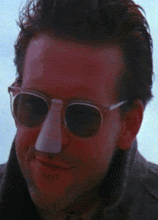I'm always pushing myself to the limit
making sure I stay ahead....
Some people have to learn
some people wait their turn
some people but not me
I was born a champion
Such egomania is common in contemporary 'R&B' (as it's misleadingly called). R. Kelly, for example, sings in 'The World's Greatest':
If anybody asks you who I am
Just stand up tall
Look 'em in the face and say
I'm that star up in the sky
I'm that mountain peak up high
Hey, I made it
I'm the world's greatest
How close this posturing comes to desperation, however, is clear from Bonnie 'Prince' Billy's ironic but beautiful version, from his 2007 EP 'Ask Forgiveness', where his sweet, tentative, cracked delivery makes the words sound like the heartbreaking incantation of a damaged man. That's the thing about the ego: it deliberately misrepresents the outside world to protect the self. But Chris Brown's world is also that of so much of our culture: its character is that of the narcissistic personality, struggling to recognise true otherness. The fact that 'now my dream and reality is simultaneous', as Brown states, is not a positive outcome but a danger.
It may be stirring to misrecognise yourself in the lines 'it’s only you believing in you' or 'go get it in sonny!' which you hear in the background as you work the cross-trainer in the gym... But what happens when reality does intrude, and one's self-belief and determination lead nowhere? This is where we open the door to another space, next to the one labelled 'Champions' - the world of 'Nobodies Who Want to Be Somebodies' as featured in films like Taxi Driver or The Assassination of Richard Nixon. 'Here is a man who would not take it anymore...'








